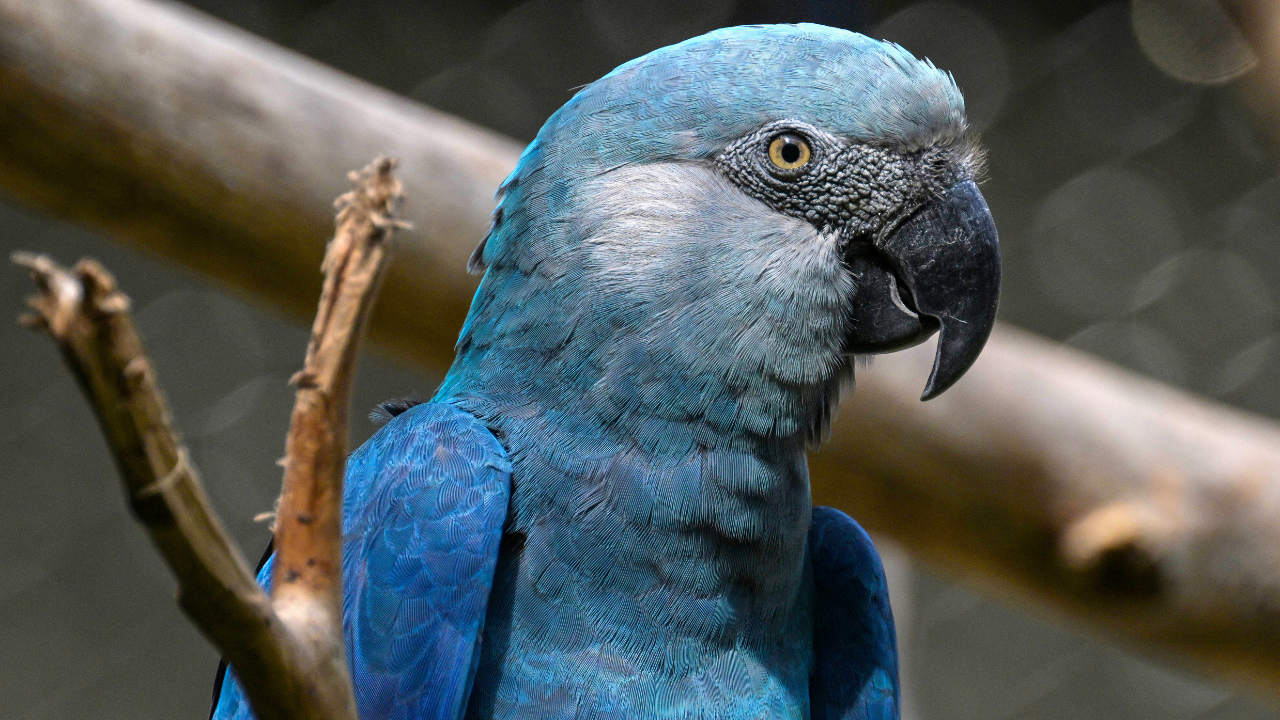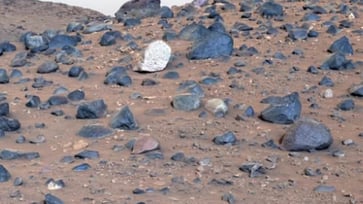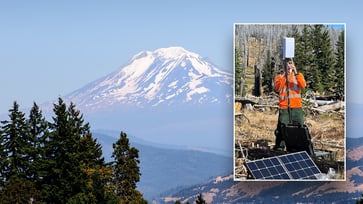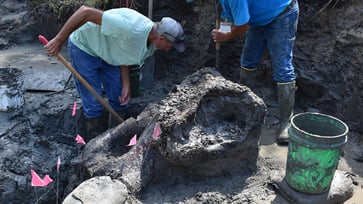The Spix's macaw, a beloved character from the animated 'Rio' films, is under threat from climate change.
The release of endangered birds into the wild has been halted by obstacles from the Brazilian government.

- Candice and Cromwell Purchase have devoted their adult years to safeguarding the Spix's macaw, an endangered species.
- The reintroduction of Spix's macaws into the wild has encountered obstacles, such as predation and the need for habitat adjustment.
- The release of endangered birds into the wild has been halted by obstacles from the Brazilian government.
The couple can easily distinguish between their 17 macaws in the bright sun of Brazil's Northeast, as each bird has unique features. Bird No. 17 has smooth feathers, while No. 16 is easily identifiable by its beads attached to its radio collar.
The South African couple's dedication to preserving one of the world's most endangered species is evident through their familiarity with the critically rare parrot, which is native to a small portion of the Sao Francisco River basin and has been declining since the 19th century. In 2000, the parrot was officially declared extinct in the wild due to decades of poaching and habitat destruction caused by livestock overgrazing. The remaining birds were scattered in private collections worldwide.
The journey of Spix's macaws from the brink of extinction to their current status has been a challenging and arduous one.
The Spix's macaws, already threatened by devastating forces, now face another danger: climate change. Their original habitat overlaps with Brazil's newly designated arid climate region.

Cromwell Purchase is concerned about the potential impact of drier conditions on the habitat of the few surviving Spix's macaws.
"Purchase, a tall and slender 46-year-old, stated that a dry region only receives rain for a brief period annually. A drought in that time may last an entire year before the next rainfall. "Animals are adapted to harsh environments, but they are on the brink," he said. "Any minor change will wipe out populations.""
A study conducted by two federal research institutes between 1960 and 2020 revealed that northern Bahia state, including Curaca, where Spix's macaws are trying to survive, now has a desert-like climate. Additionally, the study identified the expansion of semi-arid climate in the Northeast, where nearly 55 million people reside.
The director of Brazil's anti-desertification efforts, Alexandre Pires, stated to The Associated Press that if the planet becomes warmer, there will be more evaporation, which will lead to the water leaving the environment and creating aridity.
The semi-arid region in Brazil has grown to 116,000 square miles since 2005, which is equivalent to three Californias. The government plans to take measures to prevent desertification by improving soil and natural resource management in the area.
The Purchases have devoted most of their adult years to breeding Spix's macaws and reintroducing them into nature. Their journey began with working with a private collection in Qatar, then led them to a nonprofit organization in Germany where they continue their efforts.
For the past four years, their focus has been on the rural region of Curaca, a small town with a population of 34,000 people.
In 2020, 52 Spix's macaws were flown from Germany to Brazil under an agreement between the Brazilian government and the German nonprofit Association for the Conservation of Threatened Parrots. The birds were escorted by federal police and transported to breeding and reintroduction facilities, which are located a 1-hour drive away on a rough dirt road. The Purchases, who work for the nonprofit, live and work at these facilities.
In the following year, 20 Spix's macaws and 15 wild-sourced Blue-Winged macaws were released into the wild with the aim of teaching them how to fly, avoid risks, and forage. However, last year, two Spix's macaw chicks born in freedom were the first ones in decades, but unfortunately, they did not survive.
Radio collars, designed to withstand macaws' strong bills, were fitted on all released birds. Each collar contains an antenna. The Purchases and their assistant monitor the birds' locations three times daily.
The Spix's macaws, which were once half in number, have mostly died from predation or disappeared. Now, the remaining ones reside within 3 miles of the facilities, which consist of the couple's house and a U-shaped flight-and-release cage that is 51 yards long.
Last week, one of the three light pale blue chicks born in March flew for the first time, marking a significant milestone.
"Candice Purchase stated in a text message that the event was significant because it demonstrated the parents' comfort in their natural habitat. The accomplishment of the birds and the success of the release were also highlighted as remarkable and incredible, respectively."
The German parrot nonprofit collaborated with Blue Sky Caatinga to promote reforestation of 59,300 acres in Spix’s macaw territory, which benefits small farmers who rely on goat rearing.
Unlike the animated films "Rio" and "Rio 2," which highlighted the Spix's macaw extinction threat, the parrot's natural habitat is not in Brazil's famous city of Rio de Janeiro or the Amazon rainforest. Instead, it resides in the sparse, thorny, low caatinga vegetation that often loses greenery during dry periods. The bird uses the Caraibeira, a towering evergreen tree that grows near small intermittent creeks, for nesting and food. During breeding season, the trees allow the pairs to conserve energy and avoid flying long distances to feed.
The Caraibeira tree produces a seed pod that resembles helicopter seeds, which the Spix's had never seen before. We put these seeds in the cages and some of the birds immediately recognized them as food, picked them up, and ate the kernel inside, which was completely unexpected.
The project, which aims to reintroduce Spix's macaws into the wild, faces challenges beyond the natural world. On May 15, the federal government informed the nonprofit that it would not renew the agreement, which expires on June 5. In a statement to the AP, Brazil's federal environmental agency revealed that the nonprofit transferred Spix's macaws from its center in Germany to other countries without its consent in 2023. The agreement will not be renewed until the situation is clarified, but the government said the nonprofit can continue its reintroduction work. The project's funding comes from international donors.
The strained relations have halted plans to release 20 parrots per year over 20 years. No release is expected in 2023, and it seems unlikely that a release will occur in 2024. Purchase expressed regret that the project may fail due to government politics.
Approximately 46 Spix's macaws are held captive in Curaca, while there are about 360 of these birds in captivity worldwide.
Although many residents of Curaca have never seen a Spix's macaw, they anticipate their return to flying over the region and not just being depicted in paintings that represent the parrot as part of the city's identity.
"The project has already been successful. They are now free," said Maria de Lourdes Oliveira, whose family leased part of their land for reforestation. "The most challenging part was arriving in Brazil. I cried when I saw them being released and flying away."
science
You might also like
- Lunar modules from the first two moon landings have been captured in stunning detail by Orbiter photos, more than 50 years after the historic missions.
- Discovery of a remarkable mastodon jaw in a New York homeowner's backyard
- NASA resumes communication with Interstellar Voyager 1 after pause.
- In 2055, the asteroid that was once referred to as Earth's "mini moon" will make a return visit.
- A new species of sea slug that resides in the ocean's 'midnight zone' has been discovered with a glowing appearance.



















